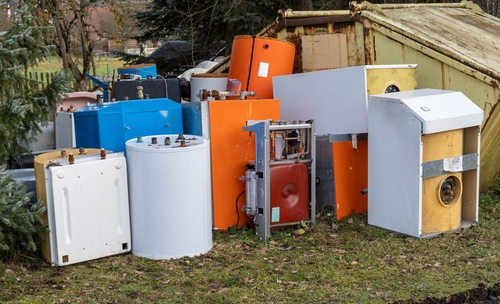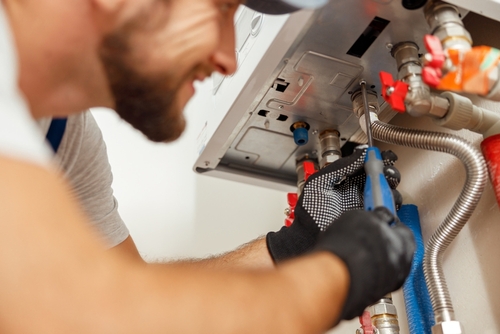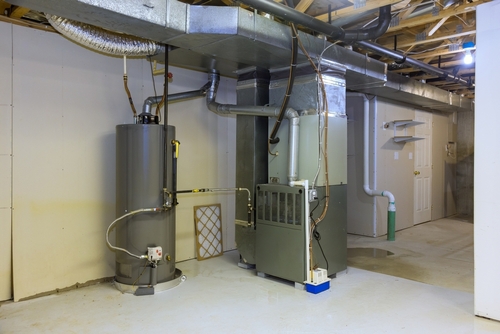Recycling a water heater can seem daunting, but it offers numerous benefits for both the environment and your wallet. Yes, you can recycle your old water heater, often by scrapping it for metal at local recycling centers. This process typically involves draining the tank, which is usually required at larger centers before taking it in.
Aside from taking your water heater to a recycling center, there are various ways to repurpose its parts. For DIY enthusiasts, the components like brass fittings, copper wires, and aluminum anodes can be used in several useful projects around the house. This makes recycling not only environmentally friendly but also creatively rewarding.
If dismantling a water heater sounds complex, disposing of it through professional services is another practical option. You might consider hiring a qualified technician or plumber to safely disconnect and remove the unit, especially if it has complex plumbing, electrical, or gas connections.
 When it comes to disposing of or donating your old water heater, there are several avenues you can explore. These options include donating to charitable organizations and utilizing recycling and disposal services.
When it comes to disposing of or donating your old water heater, there are several avenues you can explore. These options include donating to charitable organizations and utilizing recycling and disposal services.
 To ensure the efficient operation of your new water heater, it is essential to choose an eco-friendly model and follow proper installation and maintenance procedures. This approach helps in conserving energy and extending the lifespan of your unit.
To ensure the efficient operation of your new water heater, it is essential to choose an eco-friendly model and follow proper installation and maintenance procedures. This approach helps in conserving energy and extending the lifespan of your unit.
Key Takeaways
- Recycling your old water heater is possible and beneficial.
- Useful components can be repurposed for DIY projects.
- Professional services can simplify the disposal process.
Understanding Water Heater Recycling
Recycling a water heater provides environmental benefits and involves specific steps that ensure safe and effective disposal. This process keeps valuable materials out of landfills and promotes sustainability.Benefits of Recycling a Water Heater
Recycling your old water heater helps reduce landfill waste and conserve natural resources. The metal components, such as steel and copper, can be repurposed for other products. This reduces the need for mining new materials, which in turn lowers energy consumption and pollution. Additionally, keeping these materials out of landfills prevents harmful substances from contaminating the environment. Scrap metal can be sold, potentially earning you some extra cash while contributing to eco-friendly practices. The process also highlights your commitment to responsible waste management.Recycling Process Overview
The first step in recycling a water heater is to ensure it is fully drained. You may need to disconnect the inlet and outlet pipes, as well as remove any bolts or screws securing the heater. It’s important to handle the unit carefully to avoid damage. Once prepared, take the heater to a recycling facility. Many facilities accept water heaters for their valuable scrap metal. Some may also dismantle the heater to separate different materials. Always check with your local recycling center for specific requirements and accepted items. For those interested in DIY projects, an old water heater can be repurposed. Ideas include converting it into a storage tank or even a solar-heated water system. This not only extends the life of the appliance but also provides innovative uses for your household.Preparation for Recycling
Before recycling your old water heater, it’s crucial to properly assess its condition and dismantle it for safe disposal. This ensures efficient recycling and reduces potential hazards such as gas leaks or environmental damage.Assessing the Condition
First, inspect your old water heater for any visible damage. Check for signs of rust, corrosion, or leaks. For gas water heaters, ensure the gas line and gas regulator are intact. Look for any signs of hazardous gases around the unit. Older models may have deteriorated valves or fittings that could pose risks. Knowing the condition helps determine the best recycling method and whether any parts can be salvaged or reused.Dismantling and Component Separation
Begin by turning off the power supply, whether it’s electricity or gas. Drain the tank completely to remove any residual water. Carefully detach the gas line, valves, and gas regulator. Next, remove any copper wiring connected to the unit. This includes the anode rod, which can often be unscrewed from the top of the heater. Separate the metal components that can be recycled, like the steel body and copper elements. Each dismantled part should be sorted and disposed of properly at a registered recycling facility. This process ensures safety and maximizes recycling efficiency.Disposal and Donation Options
 When it comes to disposing of or donating your old water heater, there are several avenues you can explore. These options include donating to charitable organizations and utilizing recycling and disposal services.
When it comes to disposing of or donating your old water heater, there are several avenues you can explore. These options include donating to charitable organizations and utilizing recycling and disposal services.
Donating to Charitable Organizations
If your water heater is still in working condition, you might consider donating it to organizations like Goodwill, The Salvation Army, or Habitat for Humanity. These entities often accept functional appliances and can put them to good use in various programs or help low-income families. Contact your local branches of these organizations to see if they accept water heaters. Ensure the unit is clean and in good working order before donating. Donating not only supports a good cause but also reduces waste, giving functional items a second life.Recycling and Disposal Services
For water heaters that are no longer functional, recycling and disposal services are the best options. Many recycling centers accept old water heaters for scrap metal. Ensure the water heater is fully drained before recycling. Some facilities may even require you to strip down the heater to separate recyclable parts. You can also utilize specialized water heater disposal services. These services will typically pick up the unit from your location and ensure it’s disposed of properly. Contact your local waste management authority or waste management department for information on any additional steps you need to take. Using recycling and specialized disposal services helps prevent hazardous materials from ending up in landfills and ensures the sustainable disposal of your old water heater.Selling or Repurposing Your Old Water Heater
When recycling an old water heater, you can either sell it for its scrap metal value or repurpose it creatively. Each approach can be both environmentally friendly and financially rewarding.Scrap Metal Value
Old water heaters contain valuable materials like copper, brass, and steel. You should drain and disassemble the unit to separate these metals. Copper and brass are particularly valuable, often fetching higher prices at scrap yards. Many recycling programs and buyback programs accept water heaters. They might even offer pickup services, making it convenient to scrap it. Always check the current market rates for metals to get the best value. Remember to bring a full tank, as some places may pay more for intact units.Creative Repurposing Ideas
Repurposing your old water heater can turn it into functional and unique household items. For example, you can convert it into a smoker or grill. By cutting the heater and adding some modifications, you can have a durable outdoor cooker. Alternatively, old heaters can be made into storage tanks, planters, or even fire pits. This is a great way to add value to your garden or home. Simple DIY projects like these not only recycle the heater but also provide handy new items for your use. For detailed ideas and guides, you can explore DIY uses for old water heaters and unique repurposing methods.Installation Tips for a New Water Heater
 To ensure the efficient operation of your new water heater, it is essential to choose an eco-friendly model and follow proper installation and maintenance procedures. This approach helps in conserving energy and extending the lifespan of your unit.
To ensure the efficient operation of your new water heater, it is essential to choose an eco-friendly model and follow proper installation and maintenance procedures. This approach helps in conserving energy and extending the lifespan of your unit.
Choosing an Eco-Friendly Water Heater
When picking a new water heater, consider energy-efficient models like a solar water heater or a hybrid electric water heater. These options significantly reduce energy consumption and lower utility bills. Solar water heaters utilize the sun’s energy to heat water, making them a sustainable choice. They often require additional installation steps, such as mounting solar panels. Water heater boosters are another option. They increase the capacity of your current hot water system without requiring a larger tank, contributing to energy conservation. Research models with high Energy Star ratings. These models meet strict energy efficiency guidelines set by the U.S. Environmental Protection Agency.Proper Installation and Maintenance
Proper installation is crucial for the performance and longevity of your water heater. Start by locating the shut-off valve on the cold water line. Turn off the valve to cut the water supply before installation. Ensure the installation area is well-ventilated. Proper ventilation prevents gas buildup and reduces the risk of carbon monoxide poisoning in gas water heaters. After installation, adjust the thermostat to your desired temperature. Keep it at an energy-efficient setting, typically around 120°F (49°C). Check for any leaks by inspecting the connections. Tighten fittings as needed and test the system for water flow. Avoid over-tightening as it may cause damage. Regular maintenance is also critical. Flush the tank annually to remove sediment buildup, and inspect the anode rod every 3 years to prevent corrosion. Finally, educate your household on energy-saving tips like reducing shower time. Proper use can significantly extend the lifespan of your new water heater. Implementing these steps ensures you get the most out of your hot water system.Frequently Asked Questions
Here are some common questions about recycling water heaters, including details on finding recycling centers, potential compensation, and cost considerations.How can I find a recycling center for my old water heater?
To locate a recycling center, use online tools or directories such as those found on Recycling Center Near Me. Many centers accept old water heaters for scrap metals, making the process straightforward.Are there any options for free disposal of a water heater?
Some municipalities offer free bulk waste pickup, including water heaters. Additionally, stores like Home Depot occasionally offer disposal services when you purchase a new unit. Check local regulations and services to see if free disposal is available in your area.Can I receive compensation for recycling my water heater?
Yes, you may receive compensation since water heaters contain valuable metals. Recycling centers often pay for metals like copper and steel. For specific details, visit Home Inspection Insider.What is the scrap value of a typical 40 gallon water heater?
The scrap value varies based on the metal content and market prices. On average, a 40-gallon water heater may be worth between $10 and $30 at a recycling center. Prices fluctuate, so check current rates before recycling.What are the costs associated with water heater disposal?
Costs can include transportation and possible disposal fees if not covered by a store or municipality. If professional disconnection is needed, expect to pay for those services. Review options on Angi for safe and proper disposal steps.What is the process for recycling a water heater at a local Home Depot?
At Home Depot, purchase a new water heater and inquire about haul-away services for your old unit. They typically handle the recycling and disposal, but ensure old units are drained and disconnected. More information can be found at HomeScale.RECENT BLOGS
 A Homeowner’s Guide to Flash Flood Preparation, Cleanup, and Long-Term Protection
A Homeowner’s Guide to Flash Flood Preparation, Cleanup, and Long-Term Protection
Date: May 27 ,2025
 Everything You Need to Know About Garbage Bin Rental: Sizes, Costs, and Practical Tips for Every Project
Everything You Need to Know About Garbage Bin Rental: Sizes, Costs, and Practical Tips for Every Project
Date: May 14 ,2025
 Safe Disposal Methods for Refrigerators: Recycling, Donation, and Removal Options
Safe Disposal Methods for Refrigerators: Recycling, Donation, and Removal Options
Date: April 29 ,2025
Our Reviews
LATEST BLOGS








